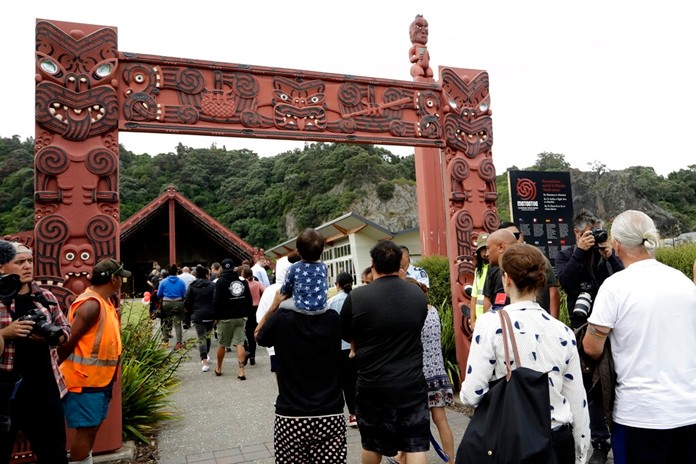
WHAKATANE, New Zealand (AP) — New Zealand military specialists recovered six bodies from a small volcanic island Friday days after an eruption claimed at least eight other lives and left a toxic and volatile landscape.
The eight specialists wearing protective clothing and using breathing apparatuses landed by helicopter and found six of the bodies thought to remain on White Island since the eruption Monday. The bodies were airlifted to a ship near the island off New Zealand’s eastern coast where scientists and other police and military personnel monitored the risky operation.
Scientists have warned that gases on the island are so toxic and corrosive that a single inhalation could be fatal.
Police said another recovery operation would be made later to recover the two bodies that couldn’t be found.
Police Deputy Commissioner Wally Haumaha said the families cheered when they were told of the successful recovery of six bodies and expressed joy and relief.
“They’ve got their loved ones coming home,” Haumaha said.
The bodies will be taken to Auckland for medical examination and identification. The eight victims that had been left on the island are thought to be six Australians and two New Zealanders, both tour guides.
Conditions were good for the operation, with light winds and calm seas, and the volcano was “quiet” as the team worked, Police Deputy Commissioner Mike Clement said.
The specialists were all safe, said Police Deputy Commissioner John Tims, who is also national operations commander. He praised “their efforts and the bravery they have shown.”
Scientists have warned that White Island, the tip of a mostly undersea volcano, is “highly volatile,” and has been venting steam and mud regularly.
The unrest delayed the recovery of the last victims of Monday’s eruption, which occurred as 47 tourists and their guides were exploring the island. Many of the survivors were severely burned. Australia has returned several of its patients to burn units back home, and specialist medical teams were heading to New Zealand from Australia, Britain and the United States.
Skin banks were also sending tissue to New Zealand to use for grafts.
Authorities say 24 Australians, nine Americans, five New Zealanders, four Germans, two Britons, two Chinese and a Malaysian were visiting the island Monday at the time of the eruption. Many were from a Royal Caribbean cruise ship that had left Sydney two days earlier.
 |
 |
 |





